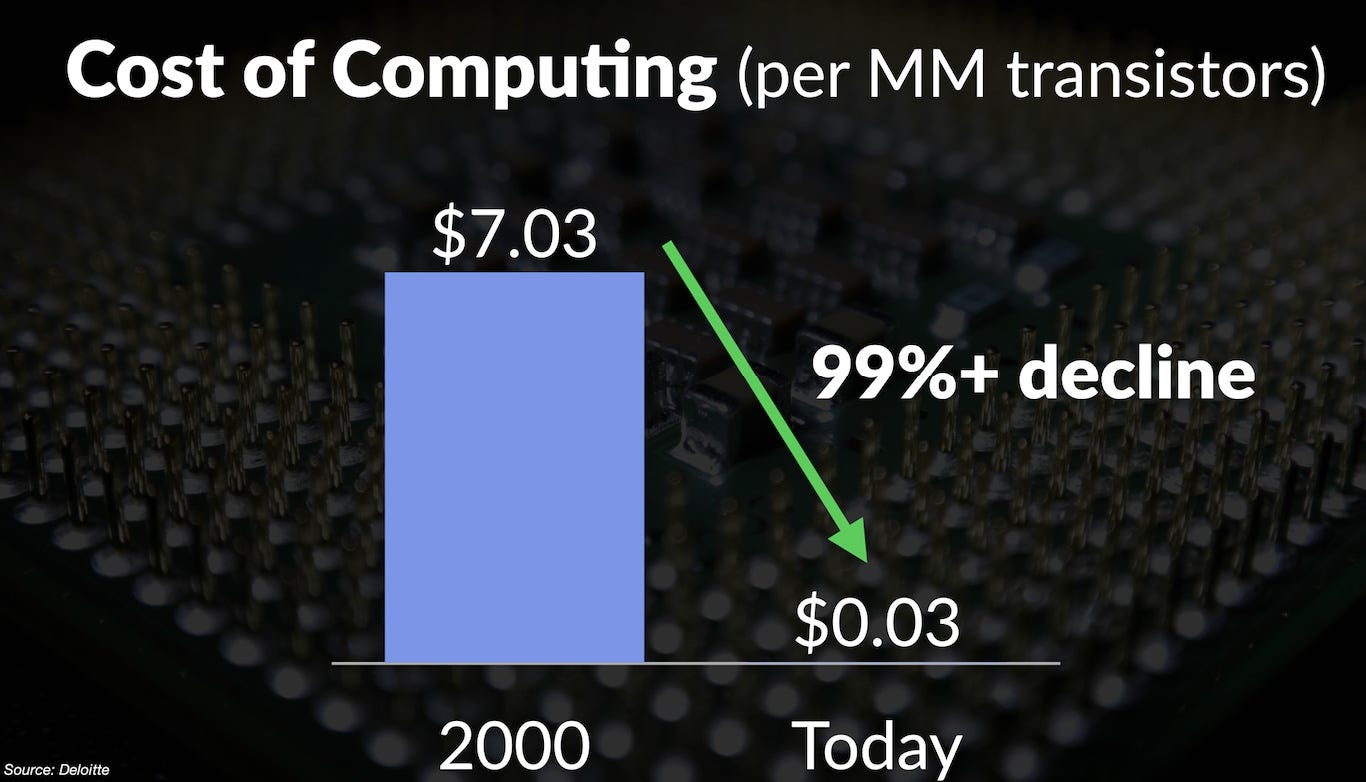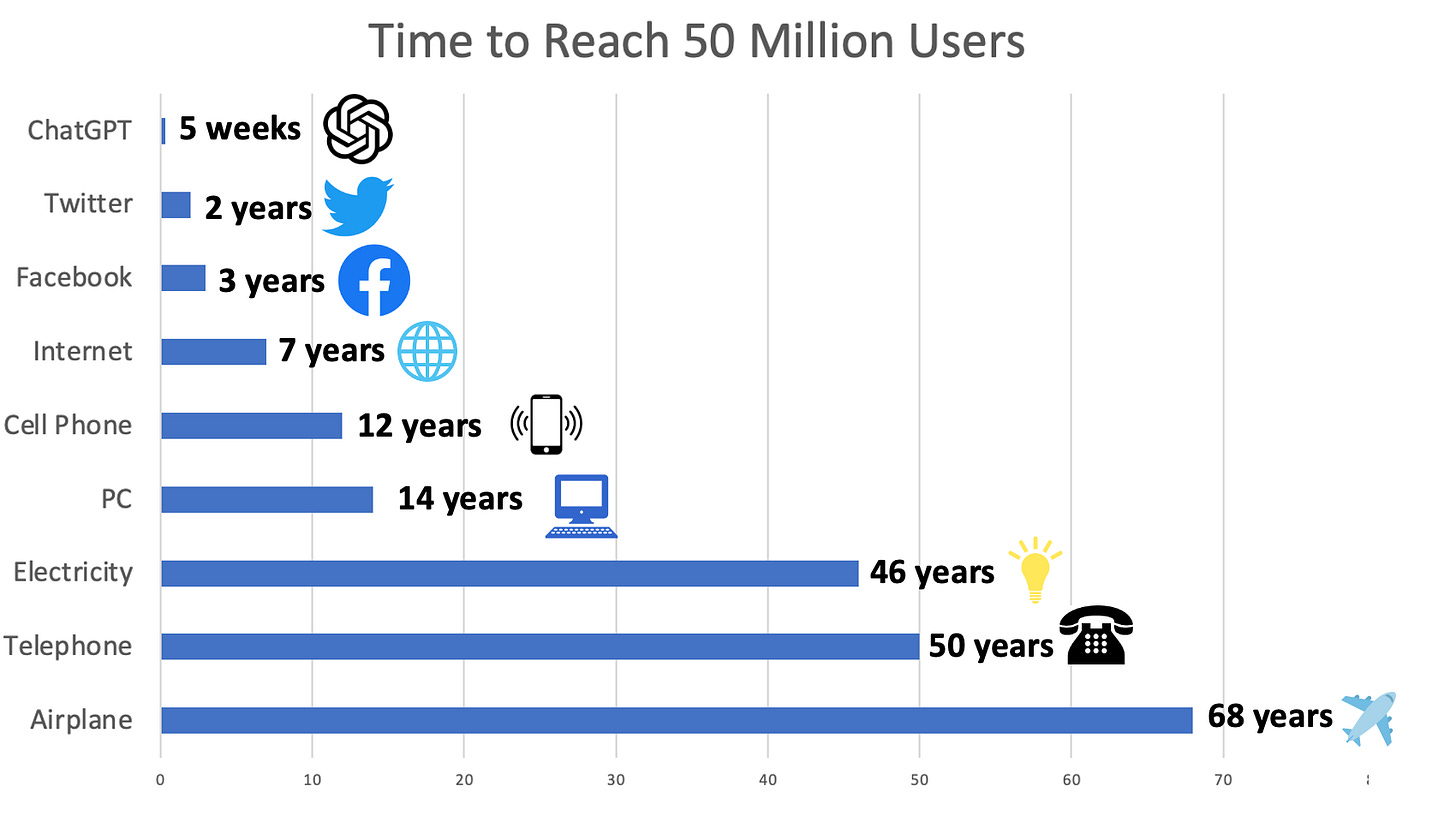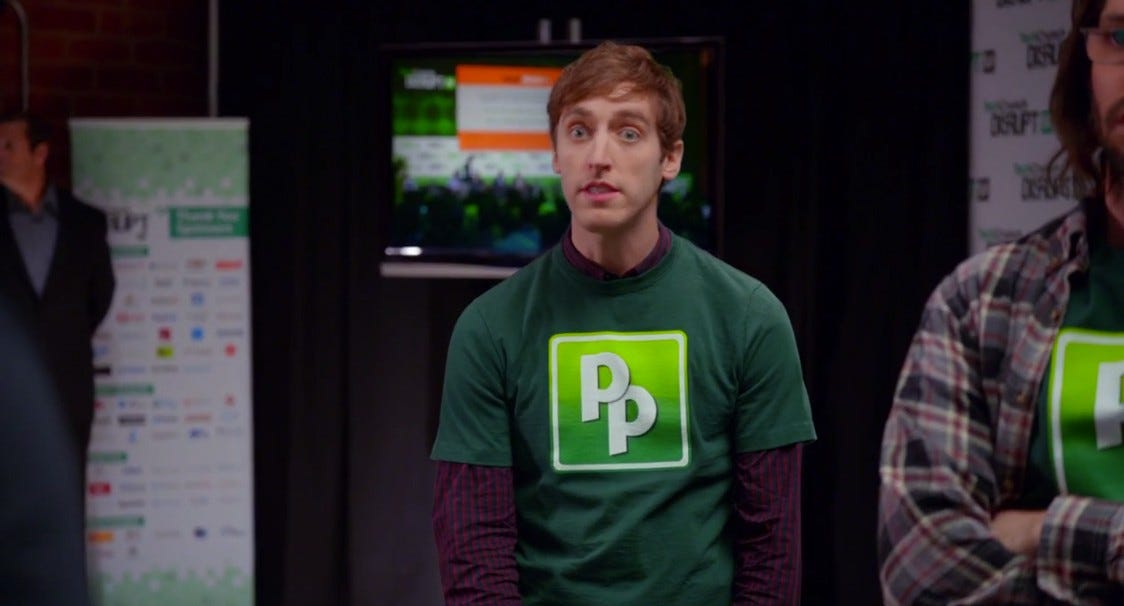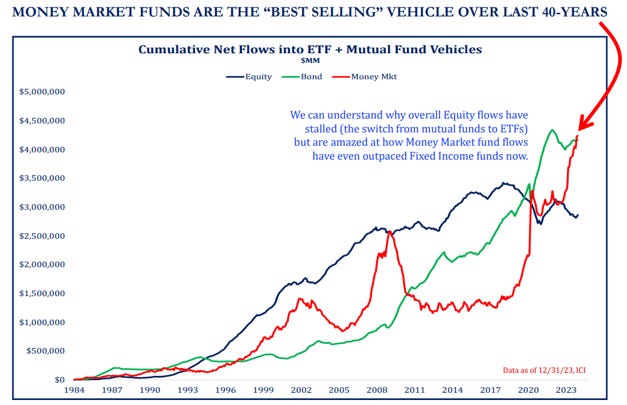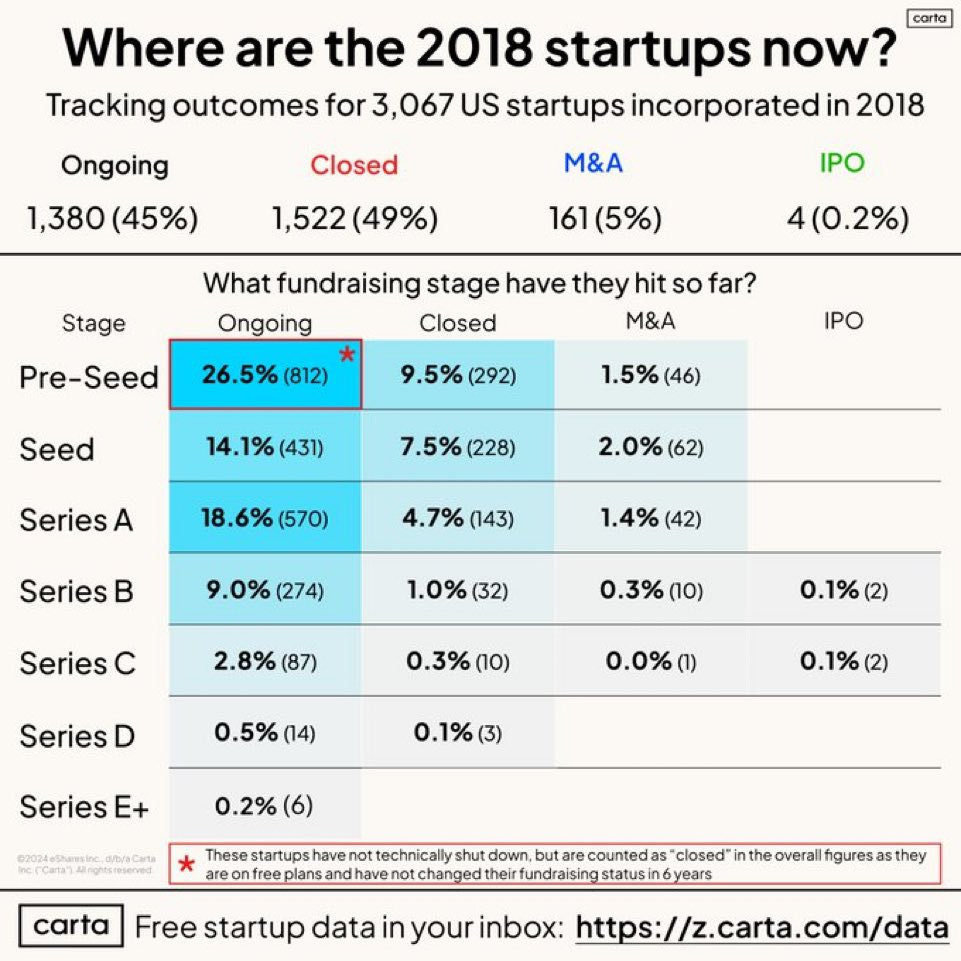EIEIO...Seasons Of Change
Entrepreneurship, Innovation, Education, Impact, and Opportunity
GSV’s weekly insights on the global growth economy. Join our community of entrepreneurs, investors, executives, educators, and students getting a window to the future by subscribing here:
“If I’d asked my customers what they wanted, they’d have said ‘Don’t change anything.’” – Henry Ford
“I can’t change the direction of the wind but I can adjust my sails so I always get to my destination.” – Jimmy Dean
“Keep your face to the sunshine and you can’t see a shadow.” – Helen Keller
Last Tuesday, pretty much without notice, Winter technically turned to Spring. Nothing really changed from the day before, not the weather, not the time the Sun rose and set, not what my lawn looked like.
One thing that we know for sure is that things change, and over time they can change dramatically.
For example, when the United States was created around 1800, it was the East Coast minus Florida.
To get from the East Coast to the West Coast would take a generation and you'd lose half your travel party. Today, when you go from New York City to San Francisco, it takes 6 hours. If your Wi-Fi doesn't work, you're pissed off.
Here's a picture of the Tour de France 100 years ago.
If you look closely at that picture, what you see is that they're all smoking cigarettes, because 100 years ago it was thought that cigarettes actually enhanced your athletic performance.
100 years ago, Detroit, Michigan was what Silicon Valley is today, and Henry Ford was the Steve Jobs or Elon Musk of the time.
100 years ago, “The Farm” was a university that few people East of the Mississippi had ever heard of – Stanford.
What is now Silicon Valley was made up of apple and apricot orchards.
Today Silicon Valley is the place where many of the game-changing businesses that have transformed society have been born. From Google to Apple, to Intel to Facebook, it's the home of technology innovation.
Nearly 60 years ago, Gordon Moore had this idea that computing power was going to double every couple of years. What's so fascinating about what became known as Moore's Law was it wasn't a physical or scientific law. It was basically Gordon Moore imposing his willpower on the technology industry and not only transforming the sector, but society as we know it.
Looking at the impact of Moore's Law, even just in the last 20 years, the cost of computing has gone down 99%. The cost of storage is basically free with infinite capacity.
If the automobile industry had made that same type of progress, the Ford Taurus that cost $20,000 in 1990 would be less than a dollar today, and you'd throw it away. Moreover, Detroit wouldn't be a shadow of its former self as it is today – again, a reminder of how dramatic change can happen in a regressive way.
When Apple introduced the iPhone in May of 2007, its market cap was $70 billion, which is exactly what BlackBerry's market cap was (for those who remember BlackBerry). BlackBerry was so popular at the time that people called them crackberries because people were addicted to being on their “smart device.”
Well, looking today, BlackBerry's market cap is a shadow of its former self, and Apple's market cap is nearly $3 trillion.
The innovation around the iPhone wasn't so much the phone itself, but the App Store, which, through network effects, made this incredibly valuable device for both the consumer and as a channel for innovators to reach tens of millions of potential users.
Take a look at the picture above. This is St. Peter's Square at the Vatican in 2005.
Here's St. Peter's Square today.
Obviously, what's changed in the last nearly 20 years is that everyone's smartphone has a camera, and everyone has become a digital photographer.
In the same period that everyone on the planet started taking digital photos, Kodak, which was synonymous with photography – in fact had the patent for digital photography – went bankrupt.
So not only does change happen with profound impact over time, but it’s happening at faster and faster rates.
Let’s look at some timelines of how long it took new technologies to reach 50 million people.
The airplane took 68 years after Orville and Wilbur Wright completed their first flight.
The telephone took 50 years.
Electricity took 46 years.
The personal computer took 14 years.
The cell phone took 12 years.
The Internet took 7 years.
Facebook took 3 years.
Twitter took 2 years.
ChatGPT took 5 weeks.
Again, we've never seen change happen as fast as it's happening.
AI is obviously a huge accelerator, and we call this a gigatrend. We believe megatrends are important to focus on because they create the tailwinds of the back of opportunities.
Well, a gigatrend is significantly more powerful than even that, creating gargantuan tailwinds.
It's such a big idea and such a big change, and its impact will be so great, that we've created a specific event in front of our annual ASU+GSV Summit called the AIR SHOW.
AIR represents the AI Revolution, which is this gigantic change for civilization. We say that AI is like air because it's invisible, it's ubiquitous, and you're going to need it to live.
Take a look at the fundamentals of what's happening. Human capabilities are growing on a linear basis, and technology is growing exponentially.
Today, we are here.
What this means is that we're at a place where technology is going to replace the technologist.
It’s not just blue-collar jobs that are going to be impacted, which we've seen happen through technology. It's not just white-collar jobs that are going to be impacted, such as lawyers, stockbrokers, and analysts. It's also no-collar jobs.
This prospect has definitely started to freak people out.
The reality, however, is these shifts have happened throughout history. 100 years ago, 30% of the US workforce was in farming. 100 years before that it was 98% of the workforce. Now it's 2% – of course, enhanced with technology.
While it can be scary, I think there are many jobs where this replacement is actually helpful, because having a job that a robot can do might mean a robot should do it.
There are some jobs that AI is never going to be able to do. There are irreplaceable human elements, such as a nurse's empathy with a patient or an investor’s evaluation of intangibles in a business. What I like to say is a horse that can count to ten is a remarkable horse, but it's not a remarkable mathematician.
We think about these waves in layers. The software layer changed business forever by codifying knowledge. The AI layer is making that knowledge intelligent, but humans still create the Smart layer at the top.
As Marc Andreessen said, “Software is eating the world”...BUT, AI is its teeth…and importantly, humans decide what to eat.
As my friend Bill Campbell, the Coach of Silicon Valley said, “When we have facts, we use facts. When we have opinions, we use mine.”
The more content that is AI generated, the more it becomes a commodity and the best opportunities will always be on the edge.
Good is gone, great isn’t enough, outstanding is the future.
It’s not man versus machine… it's man and machine.
The last 30 years was the “Revenge of the Nerds”, the geeks got the girls and were the ones that were critical for startup innovation. Increasingly, it's going to be “Back to the Future” and the skill set needed to adapt in this fast-changing world where technology is forcing us to adapt and evolve quicker than ever before, it goes back to having a toolkit that has many different tools.
The trend of the last 30 years has been to become more and more specialized. The hedgehog that knew one specific thing intimately well was viewed as superior compared to the fox that knew a little about a lot. The GPS to success has been turned upside down and the ability to connect dots across disciplines is more valuable than building one really good dot.
You can't use an old map and a new world.
The 7 C's are what I've been talking about for years. These are the critical, foundational skills that people need to be educated and build their lifelong learning knowledge base from.
You’ll notice that none of these C's is “coding” or “copilot”.
Obviously, there is nothing wrong with having coding skills. I think it's great, but it’s no longer the sole ticket to the future. Everyone will have a copilot for life.
The first of the seven C's is Critical Thinking – being able to look at different data and make decisions that are smart and accurate.
Second is Creativity, being able to think about things differently, out of the box.
Many AI tools have been cool magic tricks, but they effectively synthesize existing knowledge. This is super cool for a lot of things, but it's hard to imagine using that to create a symphony that reaches your soul.
Third, Communication. Communication is both spoken and written in a variety of mediums. How you effectively communicate with people, share knowledge, and create impact makes all the difference. One of the things that has happened with people being so consumed by their technology is we’ve become less effective communicators, less effective speakers, less effective writers.
Fourth, Cultural Fluency.
While there are current headwinds against globalization, it’s still a megatrend. The world is becoming a much more connected, smaller place and understanding where people are coming from is increasingly important to be effective in the world.
In 1990, only 5% of Americans had a passport. Today, that number is 48%. 20 years ago, it was hard to make a regular call, let alone an international phone call. Today, you can set up a Zoom at a moment’s notice, set up a virtual data room, and send a DocuSign. The friction of international communication is gone. Even speaking a different language instantaneously is possible.
Fifth, Civic Engagement. A healthy appreciation for the history of a country, its principles, and what the responsibility for a citizen can be and should be are fundamental for a society to survive and thrive.
Sixth, Collaboration. As we look at the world we're headed into, there's nothing more important than knowing how to work together as a team to get results. While Zoom and Slack are “collaboration tools”, they unfortunately have not enhanced peoples’ teamwork skills. Sports, however, provide great invisible learning where individuals get the skills of being on a team, but other ways that people are going to need to figure out how to collaborate.
Seventh, Character. When universities were first established, there was a foundation principle of values, and over time that has disappeared. To have a thriving civilization, it has to be built on values and character, and we think that's not to be ignored.
These principles transcend the inevitable cyclicality of life. They allow people to endure downturns and stay level-headed during boom times.
There is a natural cycle of the Seasons of Nature but also for Human Nature. In nature, the end of March signals the beginning of Spring and life begins to sprout around us. Preceding Spring was Winter where the days are colder and shorter with many’s primary objective to get through it.
From a Human Nature standpoint, we go through these same seasons. We’ve been in a Winter Season, Covid, rampant inflation, wars, a volatile stock market, disruptive technology that causes great uncertainty about the future, etc.
One cycle of Human Nature that is as old as time can be summarized in a quote by author G. Michael Hopf:
Hard times create strong men.
Strong men create good times.
Good times create weak men.
Weak men create hard times.
Unlike the meteorological seasons, we’re not exactly sure when Winter will be over and Spring will begin…but we do know it will happen. Leaders anticipate and laggards react. We know great times are ahead and we are preparing ourselves to fully participate.
As many people tend to hide and hibernate during Winter, we are anticipating the Spring and focused on identifying, analyzing, and investing in the companies that have the 5 Ps.
Great People.
Leading Product.
Huge Potential.
High Predictability.
Strong Purpose.
Market Performance
Stocks welcomed the Fed’s inaction and signaling three rate cuts were expected for 2024. NASDAQ and the S&P 500 both reached new highs rising 2.9% and 2.3%, respectively. The GSV Model Portfolio was up 2.8% and is up over 19% year to date.
NVIDIA remained on a roll ending the week at a $2.4 trillion market cap after announcing its new Blackwell chip which cost $40K. Semiconductor chips are the “picks and shovels” for the AI Revolution and investors love the group.
The “Magnificent 7” were back in business last week minus 1, with Apple falling 7% after the Justice Department sued it for its dominant iPhone position.
As has been the case for much of the year, the Market participation continues to broaden. In a very positive sign and confirmation of our 2024 outlook thesis, the Reddit IPO ripped, advancing 48% in its public debut. Astera Labs went public on Wednesday and traded up 72%. Look for other aspiring IPO to take these warm receptions as a sign to jump in – the water's fine.
We remain BULLISH.
Maggie Moe’s GSV Weekly Rap
GSV Model Portfolio
Need to Know
READ: 8 Google Employees Invented Modern AI. Here’s the Inside Story | WIRED
LISTEN: Slow's Will Quist on VC's Job to Fund the Creation of New Data Sets | Turpentine VC
WATCH: Neuralink Demo | Neuralink on X
READ: The IPO Preparation Guide | OnlyCFO's Newsletter
WATCH: Ep5. Stock Comp, AI Cold War, Valuations for LLM | BG2 with Bill Gurley, Brad Gerstner, & Bob Mylod
LISTEN: Intuitive Surgical | Business Breakdown
READ: ARK Convergence Whitepaper | ARK Invest
WATCH: We've hit 'peak hype' of the AI revolution, says DeepMind co-founder Mustafa Suleyman | CNBC
GSV’s Four I’s of Investor Sentiment
GSV tracks four primary indicators of investor sentiment: inflows and outflows of mutual funds and ETFs, IPO activity, interest rates, and inflation. Here’s how these four signals performed last week:
#1: Inflows and Outflows for Mutual Funds & ETFs
Source: X
#2: IPO Market
Source: Nasdaq
#3: Interest Rates
Source: Kobeissi Letter
#4: Inflation
Source: Charlie Bilello
Chart of the Week
Only the strong survive…of the 3,000+ startups on Carta incorporated in 2018, just 161 have exited through M&A and only 4 have gone public.
Chuckle of the Week
EIEIO…Fast Facts
Entrepreneurship: 61% – percentage of teen girls who have thought about starting a business, 7% more than teen boys (Alaska Business)
Innovation: 18.4% – average IPO pop from 1980 through 2020 (Jay Ritter)
Education: 63% – US parents who are dissatisfied with the quality of K-12 education (Gallup)
Impact: 84% – Americans who believe that businesses have a responsibility to bring social change on important issues (CSR)
Opportunity: 57% – share of top 35 companies in the Fortune 500 that were founded by either immigrants or children of immigrants (Brookings)
FEEDBACK: We love it when our readers engage with us. Send your thoughts, comments, and feedback to dashmediagsv@gmail.com – we read every email!
Connecting the Dots & EIEIO…
Old MacDonald had a farm, EIEIO. New MacDonald has a Startup….EIEIO: Entrepreneurship, Innovation, Education, Impact and Opportunity. Accordingly, we focus on these key areas of the future.
One of the core goals of GSV is to connect the dots around EIEIO and provide perspective on where things are going and why. If you like this, please forward to your friends. Onward!
Make Your Dash Count!
-MM








